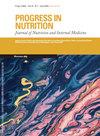The impact of combined nutraceutical supplementation on work-related stress, mood and eating disorders during the menopausal transition: A pilot study
4区 医学
Q4 Agricultural and Biological Sciences
引用次数: 2
Abstract
Objectives: Menopause represents a “window of vulnerability” in women’s life. This transition comprehends many changes: physical, metabolical and psychological. It could, also, cause difficulties at work and the most problematic symptoms are poor concentration and memory, tiredness, feeling depressed and lowered confidence. Moreover food becomes, often, a practical, easy and fast solution to manage negative emotions. The aims of this pilot study were: to analyze the existence of a possible link between menopausal transition, mood, eating behavior and well-being perception on the workplace and to verify the possible influence of nutraceutical supplementation on the above mentioned factors. Method: 40 women, with mean age 52 years old and mean BMI 33.27 were enrolled and divided into two groups: diet + behavioral advices (D), or diet + behavioral advices and a nutraceutical compound (D+N) (Assist Forte Retard® 1 cp in the evening) for four months. The following psychological questionnaires were administrated at the beginning and after four months: Zung depression scale, (ZDS); Binge Eating Scale (BES); Job Content Questionnaire ( JCQ) used to measure the investigate job related stress. After the test, each woman had an individual psychological interview aimed to investigate her personal experiences, related to what come out from the results. Results: After four months: women (D+N) achieved a statistically significant improvement in both tests (ZDS p <0.0001 Bes p <0.0083). The women (D) had no statistically significant changes in BES, even if there was better management of feeding behavior, and ZDS did not show an improvement in mood. JCQ analysis showed: women (D+N) had a moderate increase of decision-making capacity (DL 64 to 66) compared with an unchanged workload ( JD 33 to 33.5); social-support perception (SS ) showed a slight improvement even if it remained below the median line of the reference sample. In the (D) group we observed a slight increase of the workload , accompanied by a reduction of the decision-making capacity (DL 74 to 69) and by a tiny lowering of the perception of the social support (SS). Conclusions: the combination of a diet program, behavioural advice and nutraceuticals, compared to the sole diet, made it possible to relieve the emotional and eating disturbs related to the menopause and to improve the perception of a satisfactory work.综合营养补充品对绝经过渡期工作压力、情绪和饮食失调的影响:一项初步研究
目的:更年期是女性生命中一个“脆弱的窗口期”。这种转变包括身体、新陈代谢和心理上的许多变化。它还可能导致工作困难,最严重的症状是注意力不集中、记忆力差、疲劳、情绪低落和自信心下降。此外,食物往往成为管理负面情绪的一种实用、简单和快速的解决方案。本初步研究的目的是:分析更年期过渡、情绪、饮食行为和工作场所幸福感之间是否存在可能的联系,并验证营养补充剂对上述因素的可能影响。方法:40名女性,平均年龄52岁,平均BMI为33.27,分为饮食+行为建议组(D),或饮食+行为建议和营养保健组合组(D+N) (Assist Forte Retard®每晚1 cp),为期4个月。研究开始时和4个月后分别进行以下心理问卷调查:Zung抑郁量表(ZDS);暴食量表(BES);工作内容问卷(JCQ)用于测量和调查工作相关压力。测试结束后,每个女性都有一个单独的心理访谈,目的是调查她的个人经历,与测试结果有关。结果:4个月后:女性(D+N)在两项测试中均取得统计学意义上的显著改善(ZDS p <0.0001, Bes p <0.0083)。女性(D组)的BES没有统计学上的显著变化,即使有更好的喂养行为管理,ZDS也没有显示情绪的改善。JCQ分析显示:与工作负荷不变(JD 33至33.5)相比,女性(D+N)的决策能力(DL 64至66)有适度增加;社会支持知觉(SS)虽低于参考样本的中位数,但仍有轻微改善。在(D)组中,我们观察到工作量的轻微增加,伴随着决策能力的降低(DL 74至69)和社会支持感知的微小降低(SS)。结论:与单一饮食相比,饮食计划、行为建议和营养保健品的结合,可以缓解与更年期有关的情绪和饮食障碍,并提高对满意工作的看法。
本文章由计算机程序翻译,如有差异,请以英文原文为准。
求助全文
约1分钟内获得全文
求助全文
来源期刊

Progress in Nutrition
医学-营养学
CiteScore
1.40
自引率
0.00%
发文量
0
审稿时长
>12 weeks
期刊介绍:
Progress in Nutrition was founded in 1999 as an independent magazine, a multidisciplinary approach, dedicated to issues of nutrition and metabolism.
 求助内容:
求助内容: 应助结果提醒方式:
应助结果提醒方式:


